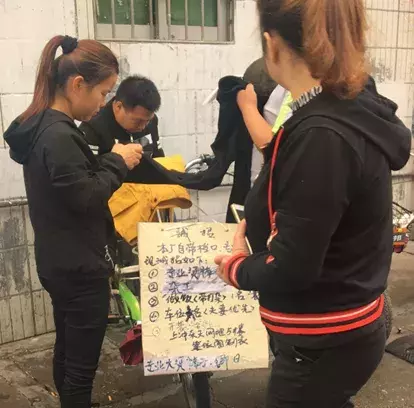Error message

By Fan Lulu and Boy Luethje
HONOLULU (July 31, 2019)—With more than 800 million Internet users, China has become the global leader in e-commerce—the buying and selling of products and services online. Taobao (roughly “treasure hunt” in English) is the leading Chinese online shopping and e-commerce website, founded by the Alibaba Group. As of 2018, more than 580 million active users visited Taobao and its sister website Tmall every month.
In 2018, there were 3,202 “Taobao villages” in 24 provinces, municipalities, and autonomous regions of China. These are clusters of firms that work together as on-line merchants based on the Taobao e-commerce platform. The vast majority are in the rural districts and townships surrounding big industrial cities along the East Coast, such as Hangzhou, Yiwu, and Guangzhou.
Taobao merchants sell clothing, other consumer items, and farm products, mostly obtained from small local factories or family-owned workshops. Individual business entities tend to be very small, averaging only two to seven employees each. For some time, such small factories and workshops have provided many of the low-end products purchased by large global brands and retailers such as WalMart or their counterparts in China. Today, their products are increasingly sold online through Taobao merchants.
The merchants and manufacturing firms in Taobao villages compete heavily against each other, but they also share production capacity and work together as subcontractors. Many clusters of small firms in China have worked together for years, but today this type of informal cooperation is facilitated by a cloud-based service platform provided by Alibaba. Growth of the principal businesses may also spark the formation of ancillary businesses in local communities, such as product photographers, graphic designers, logistics providers, and packaging specialists.
A number of towns and rural areas have benefited from the growth of Taobao villages. For example, as of 2016 there were more than 24,000 Taobao online shops in Daji, a small town in Shandong Province’s Caoxian County. Their total annual sales approached US$300 million, and more than 5,000 residents had come back from the cities to start local businesses, reversing years of outmigration.
Most Taobao manufacturing firms operate informally, and many provide flexible working conditions for people who wish to work at home or part time, such as women with young children. But there can be downsides. Workers tend to be hired as independent contractors without the protection of labor laws or collective bargaining contracts. Companies do not necessarily adhere to basic labor and safety standards, which gives rise to troubling issues such as child labor, unsafe working conditions, and failure to pay wages—issues that have been notorious in many assembly industries at the bottom of global supply chains, in China and elsewhere.
Today, such unprotected labor conditions are typical of many platform-based service industries around the world, including ride hailing, household services, data processing, and software development. What the Taobao village model has done is to expand this form of irregular employment into small-scale manufacturing.
Many Taobao merchants and manufacturers pay little or no tax, and their workers rarely receive social security benefits. Some Taobao online shop owners donate a percentage of their profits to charity, and some give back to their communities by mending roads, assisting the elderly, and helping the underprivileged. Such charitable acts, of course, are entirely dependent on the goodwill of the donors.
Although about one-fifth of Taobao villages are in officially designated poverty-stricken locations, e-commerce is no panacea for poverty reduction, particularly in China’s most remote areas. Sellers can reach buyers online, but they still need production facilities and access to transportation to ship their products. Residents in poor areas also tend to lack the technical and entrepreneurial skills required to operate an e-commerce business successfully. In such places, introduction of e-commerce opportunities needs to be coupled with significant investments in training and infrastructure development.
Grassroots entrepreneurs are the most important force behind the emergence of Taobao villages. But the support offered by Alibaba has been essential for the survival of new businesses. This support has included development of more than 100,000 express delivery routes and provision of more than US$8 billion in bank loans. Altogether, Alibaba has invested nearly US$1 billion in marketing, communication, payment, and logistics services to support growth of the Taobao platform. Favorable government programs have provided training, infrastructure, public services, and a business-friendly atmosphere that is crucial for success.
In China more than 40 percent of the population is rural, and the economic disparity between urban centers and the rural hinterland is both troubling and persistent. By connecting buyers and sellers in different locations, e-commerce has the potential to stimulate economic growth in rural areas. Yet the current lack of governance raises daunting challenges for trade unions and government entities tasked with ensuring the rights and welfare of workers.
If the negative aspects related to lack of oversight can be addressed, Taobao villages could provide a promising development model for rural and remote areas, not only in China but also in other countries of Asia.
###
This East-West Wire is based on Fan Lulu (2019), Taobao villages—the emergence of a new pattern of rural ecommerce in China and its social implications, Discussion Paper, Jakarta: Friedrich-Ebert Stiftung.
Fan Lulu is a Postdoctoral Fellow in the School of Public Administration of the South China University of Technology. She can be reached at [email protected]. Boy Luethje is the Volkswagen Endowed Chair of Industrial Relations and Social Development at Sun Yat-sen University and a Visiting Scholar at the East-West Center. He can be reached at [email protected]. This research was supported by Volkswagen Group China and the Friedrich-Ebert Stiftung.
Download a pdf version of this Wire article.
The East-West Wire is a news, commentary, and analysis service provided by the East-West Center in Honolulu. All or any part of the Wire content may be used by media with attribution to the East-West Center or the person quoted. To receive Wire articles via email, subscribe here. For links to all East-West Center media programs, fellowships and services, see EastWestCenter.org/Journalists.
The full list of East-West Wires produced by the Research Program is available on the East-West Center website at EastWestCenter.org/Research-Wire. For more on the East-West Center Research Program, see EastWestCenter.org/Research.
The East-West Center promotes better relations and understanding among the people and nations of the United States, Asia, and the Pacific through cooperative study, research, and dialogue.
Series editors:
Derek Ferrar
[email protected]
Sidney B. Westley
[email protected]
The views expressed are those of the authors and do not necessarily reflect the policy or position of the East-West Center or any organization with which the authors are affiliated.
Photo: A Taobao garment factory hires workers in an urban village. Credit: Fan Lulu
By Fan Lulu and Boy Luethje
HONOLULU (July 31, 2019)—With more than 800 million Internet users, China has become the global leader in e-commerce—the buying and selling of products and services online. Taobao (roughly “treasure hunt” in English) is the leading Chinese online shopping and e-commerce website, founded by the Alibaba Group. As of 2018, more than 580 million active users visited Taobao and its sister website Tmall every month.
In 2018, there were 3,202 “Taobao villages” in 24 provinces, municipalities, and autonomous regions of China. These are clusters of firms that work together as on-line merchants based on the Taobao e-commerce platform. The vast majority are in the rural districts and townships surrounding big industrial cities along the East Coast, such as Hangzhou, Yiwu, and Guangzhou.
Taobao merchants sell clothing, other consumer items, and farm products, mostly obtained from small local factories or family-owned workshops. Individual business entities tend to be very small, averaging only two to seven employees each. For some time, such small factories and workshops have provided many of the low-end products purchased by large global brands and retailers such as WalMart or their counterparts in China. Today, their products are increasingly sold online through Taobao merchants.
The merchants and manufacturing firms in Taobao villages compete heavily against each other, but they also share production capacity and work together as subcontractors. Many clusters of small firms in China have worked together for years, but today this type of informal cooperation is facilitated by a cloud-based service platform provided by Alibaba. Growth of the principal businesses may also spark the formation of ancillary businesses in local communities, such as product photographers, graphic designers, logistics providers, and packaging specialists.
A number of towns and rural areas have benefited from the growth of Taobao villages. For example, as of 2016 there were more than 24,000 Taobao online shops in Daji, a small town in Shandong Province’s Caoxian County. Their total annual sales approached US$300 million, and more than 5,000 residents had come back from the cities to start local businesses, reversing years of outmigration.
Most Taobao manufacturing firms operate informally, and many provide flexible working conditions for people who wish to work at home or part time, such as women with young children. But there can be downsides. Workers tend to be hired as independent contractors without the protection of labor laws or collective bargaining contracts. Companies do not necessarily adhere to basic labor and safety standards, which gives rise to troubling issues such as child labor, unsafe working conditions, and failure to pay wages—issues that have been notorious in many assembly industries at the bottom of global supply chains, in China and elsewhere.
Today, such unprotected labor conditions are typical of many platform-based service industries around the world, including ride hailing, household services, data processing, and software development. What the Taobao village model has done is to expand this form of irregular employment into small-scale manufacturing.
Many Taobao merchants and manufacturers pay little or no tax, and their workers rarely receive social security benefits. Some Taobao online shop owners donate a percentage of their profits to charity, and some give back to their communities by mending roads, assisting the elderly, and helping the underprivileged. Such charitable acts, of course, are entirely dependent on the goodwill of the donors.
Although about one-fifth of Taobao villages are in officially designated poverty-stricken locations, e-commerce is no panacea for poverty reduction, particularly in China’s most remote areas. Sellers can reach buyers online, but they still need production facilities and access to transportation to ship their products. Residents in poor areas also tend to lack the technical and entrepreneurial skills required to operate an e-commerce business successfully. In such places, introduction of e-commerce opportunities needs to be coupled with significant investments in training and infrastructure development.
Grassroots entrepreneurs are the most important force behind the emergence of Taobao villages. But the support offered by Alibaba has been essential for the survival of new businesses. This support has included development of more than 100,000 express delivery routes and provision of more than US$8 billion in bank loans. Altogether, Alibaba has invested nearly US$1 billion in marketing, communication, payment, and logistics services to support growth of the Taobao platform. Favorable government programs have provided training, infrastructure, public services, and a business-friendly atmosphere that is crucial for success.
In China more than 40 percent of the population is rural, and the economic disparity between urban centers and the rural hinterland is both troubling and persistent. By connecting buyers and sellers in different locations, e-commerce has the potential to stimulate economic growth in rural areas. Yet the current lack of governance raises daunting challenges for trade unions and government entities tasked with ensuring the rights and welfare of workers.
If the negative aspects related to lack of oversight can be addressed, Taobao villages could provide a promising development model for rural and remote areas, not only in China but also in other countries of Asia.
###
This East-West Wire is based on Fan Lulu (2019), Taobao villages—the emergence of a new pattern of rural ecommerce in China and its social implications, Discussion Paper, Jakarta: Friedrich-Ebert Stiftung.
Fan Lulu is a Postdoctoral Fellow in the School of Public Administration of the South China University of Technology. She can be reached at [email protected]. Boy Luethje is the Volkswagen Endowed Chair of Industrial Relations and Social Development at Sun Yat-sen University and a Visiting Scholar at the East-West Center. He can be reached at [email protected]. This research was supported by Volkswagen Group China and the Friedrich-Ebert Stiftung.
Download a pdf version of this Wire article.
The East-West Wire is a news, commentary, and analysis service provided by the East-West Center in Honolulu. All or any part of the Wire content may be used by media with attribution to the East-West Center or the person quoted. To receive Wire articles via email, subscribe here. For links to all East-West Center media programs, fellowships and services, see EastWestCenter.org/Journalists.
The full list of East-West Wires produced by the Research Program is available on the East-West Center website at EastWestCenter.org/Research-Wire. For more on the East-West Center Research Program, see EastWestCenter.org/Research.
The East-West Center promotes better relations and understanding among the people and nations of the United States, Asia, and the Pacific through cooperative study, research, and dialogue.
Series editors:
Derek Ferrar
[email protected]
Sidney B. Westley
[email protected]
The views expressed are those of the authors and do not necessarily reflect the policy or position of the East-West Center or any organization with which the authors are affiliated.
Photo: A Taobao garment factory hires workers in an urban village. Credit: Fan Lulu
East-West Wire
News, Commentary, and Analysis
The East-West Wire is a news, commentary, and analysis service provided by the East-West Center in Honolulu. Any part or all of the Wire content may be used by media with attribution to the East-West Center or the person quoted. To receive East-West Center Wire media releases via email, subscribe here.
For links to all East-West Center media programs, fellowships and services, see www.eastwestcenter.org/journalists.







